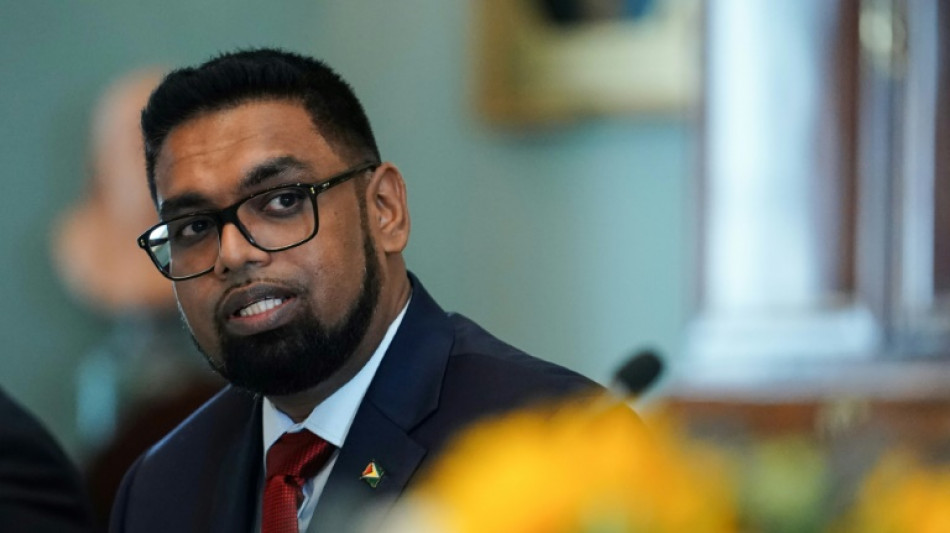
-
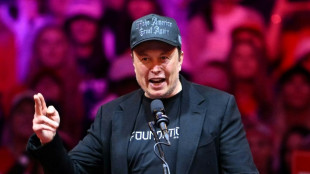 Tesla proposes package for Musk that could top $1 trillion
Tesla proposes package for Musk that could top $1 trillion
-
Shiite ministers walk out of Lebanon cabinet discussion on Hezbollah disarmament

-
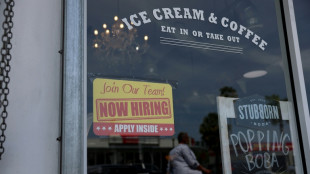 Stocks rise, dollar drops as US jobs data boosts rate cut hopes
Stocks rise, dollar drops as US jobs data boosts rate cut hopes
-
New folk music documentary taps into Bob Dylan revival

-
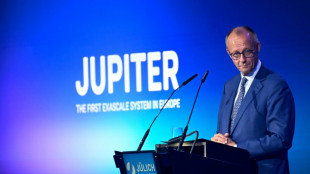 Europe bets on supercomputer to catch up in AI race
Europe bets on supercomputer to catch up in AI race
-
11 foreigners killed in Portugal funicular crash
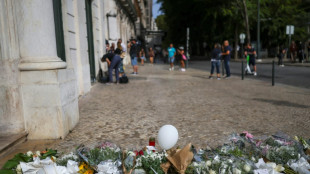
-
 'Roblox' game to impose age controls this year
'Roblox' game to impose age controls this year
-
WHO backs weight-loss drugs, urges cheap generics

-
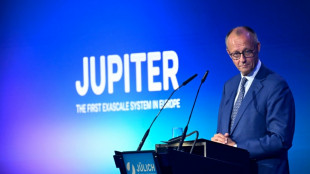 Merz inaugurates supercomputer, says Europe can catch up in AI race
Merz inaugurates supercomputer, says Europe can catch up in AI race
-
Hamilton tops Monza practice in Ferrari one-two

-
 Hitwomen: how teen girls are being used in Sweden crime wars
Hitwomen: how teen girls are being used in Sweden crime wars
-
South Africa's Du Preez out of Rugby Championship with injury

-
 Newcastle's Burn has 'nothing but good wishes' for Isak
Newcastle's Burn has 'nothing but good wishes' for Isak
-
Israel army begins targeting Gaza City high-rises

-
 Socceroos edge New Zealand 1-0 to keep unbeaten streak intact
Socceroos edge New Zealand 1-0 to keep unbeaten streak intact
-
Don't panic: UK phones to sound at once in emergency drill

-
 'No curse' on England, insists Tuchel despite near misses
'No curse' on England, insists Tuchel despite near misses
-
Venice Film Festival a red carpet pulpit for 'King Giorgio' Armani

-
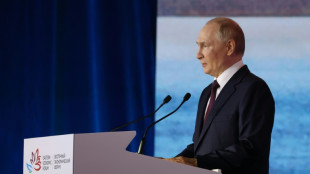 Putin threatens to target any Western troops sent to Ukraine
Putin threatens to target any Western troops sent to Ukraine
-
The massive debt behind France's political turmoil
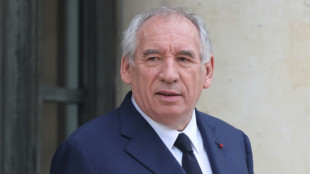
-
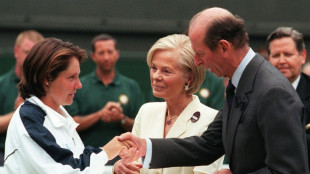 Britain's Duchess of Kent dies aged 92: palace
Britain's Duchess of Kent dies aged 92: palace
-
China to impose temporary duties on EU pork

-
 Stocks rise ahead of key US jobs data
Stocks rise ahead of key US jobs data
-
England's Stones out of Andorra, Serbia World Cup qualifiers

-
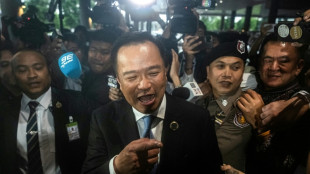 Conservative Thai tycoon wins parliament vote to become PM
Conservative Thai tycoon wins parliament vote to become PM
-
Lebanon to discuss army plan to disarm Hezbollah

-
 China to impose temporary duties on EU pork over 'dumping'
China to impose temporary duties on EU pork over 'dumping'
-
US sanctions Palestinian rights groups over ICC probe
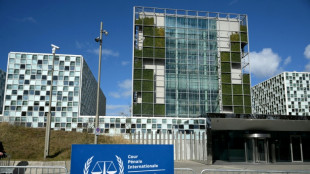
-
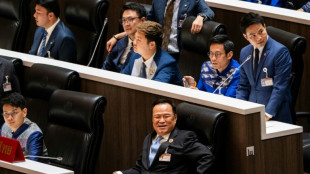 Sax-playing pilot Anutin lands Thai prime ministerial vote
Sax-playing pilot Anutin lands Thai prime ministerial vote
-
PSG's Geyoro joins London City Lionesses for reported women's world record £1.43 mn

-
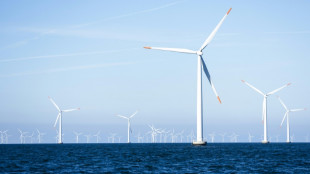 Danish wind giant sues US government over project halt
Danish wind giant sues US government over project halt
-
Asian, European markets rally ahead of US jobs data

-
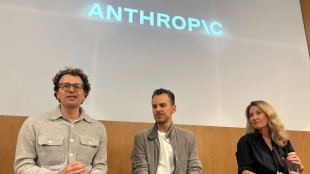 US AI giant Anthropic bars Chinese-owned entities
US AI giant Anthropic bars Chinese-owned entities
-
Powerful quake aftershocks cause more injuries in Afghanistan
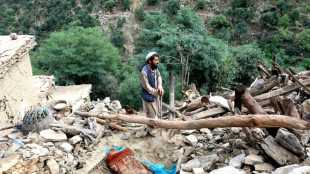
-
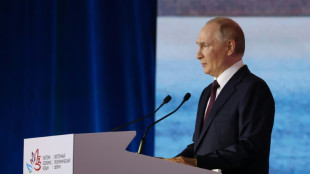 Putin threatens to target any Western troops in Ukraine
Putin threatens to target any Western troops in Ukraine
-
German factory orders drop in new blow to economy
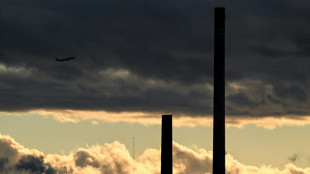
-
 Positivity wins as Anisimova wills way into US Open final
Positivity wins as Anisimova wills way into US Open final
-
Osaka eager for more after US Open run ends in semi-finals

-
 Savea-Kolisi clash one to savour, says All Blacks captain Barrett
Savea-Kolisi clash one to savour, says All Blacks captain Barrett
-
Cooling US jobs market in focus as political scrutiny heats up
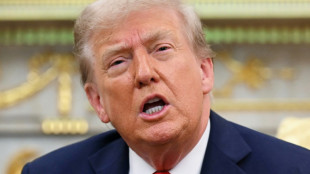
-
 Sabalenka returns to US Open final as Anisimova sinks Osaka
Sabalenka returns to US Open final as Anisimova sinks Osaka
-
Chinese firms pay price of jihadist strikes against Mali junta
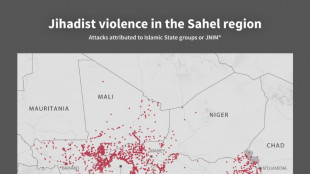
-
 Europe's fastest supercomputer to boost AI drive
Europe's fastest supercomputer to boost AI drive
-
Super Bowl champion Eagles down Cowboys in NFL season opener

-
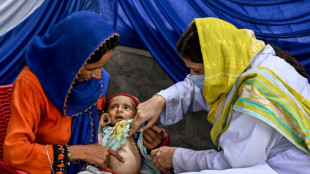 New recipes help Pakistani mothers ward off malnutrition
New recipes help Pakistani mothers ward off malnutrition
-
'Brutal': Olympic pole vault champion Kennedy pulls out of worlds

-
 Lebanon to discuss army's plan to disarm Hezbollah
Lebanon to discuss army's plan to disarm Hezbollah
-
Australia and Argentina primed for battle of the fittest

-
 Asian markets rally as Chinese stocks selloff eases
Asian markets rally as Chinese stocks selloff eases
-
Messi hits emotional brace as Uruguay, Colombia, Paraguay seal World Cup spots


Guyana's President Irfaan Ali: oil industry 'puppet' or visionary?
Irfaan Ali, in office since 2020, is the first Guyanese leader to benefit from the South American country's massive oil reserves, which he leveraged to claim a second presidential term.
Guyana was recently found to have the biggest known crude reserves per capita in the world, and the state budget has quadrupled to $6.7 billion since production began in 2019.
It has allowed Ali to boost spending on infrastructure and social programs, and to campaign on promises to "put more money in your pocket."
At the age of 45, he claimed a second five-year term Wednesday before official results from Monday's election were published.
Venezuela's President Nicolas Maduro calls Ali "a puppet of ExxonMobil," the main oil operator in English-speaking Guyana -- a former British and Dutch colony.
Undeterred, Ali has pressed on with promises of development that will benefit all Guyanese -- among the poorest of Latin Americans.
"We have delivered. You can trust us," he repeated on the campaign trail, pointing to numerous infrastructure projects, tax cuts and expanded social programs.
His detractors accuse Ali of window-dressing and "ribbon-cutting."
- Defender of Essequibo -
From a Muslim background and Indian origins like the majority of Guyana's population, Ali was born to a couple of teachers on April 25, 1980, in a village on the opposite bank of the Demerara River from the capital Georgetown.
He studied in Britain and Jamaica, earning a doctorate in urban planning and regional development.
Ali was first elected to parliament in 2006, serving later in several ministerial positions in governments led by his center-left People's Progressive Party.
It is widely believed he was handpicked as the candidate for 2020 elections by the party's general secretary Bharrat Jagdeo -- himself a former president and still considered by many to be Guyana's most powerful man.
Ali is married, has two children, and likes to point to the bright future that oil revenues can bring for the country's young generation.
Ambitiously, he seeks to achieve this while also protecting the rainforest that covers 95 percent of Guyana and serves as a source of income through carbon credits.
On the international stage, Ali has positioned himself as a staunch defender of the oil-rich Essequibo region administered by Guyana but claimed by neighbor Venezuela in an ever-escalating territorial row.
Essequibo holds much of the oil on which Guyana is planning a more glorious future.
Ali has stood firm in the face of repeated Venezuelan threats to Essequibo, winning him the backing of many compatriots.
"We will continue to seek diplomatic solutions, but we will not tolerate threats to our territorial integrity," he vowed in March.
The territorial dispute is pending before the International Court of Justice in The Hague.
Ali has embraced closer defense cooperation with the United States, and earned Caracas's ire by welcoming a recent deployment of US warships in the Caribbean in an anti-drug operation Washington linked to a cartel it said was controlled by Maduro.
Ali's administration has been accused of corruption by the opposition, and observers from the European Union and US-based Carter Center pointed to state resources being used for campaigning in Guyana's latest election, which gave the ruling party an unfair advantage.
R.Braegger--VB
